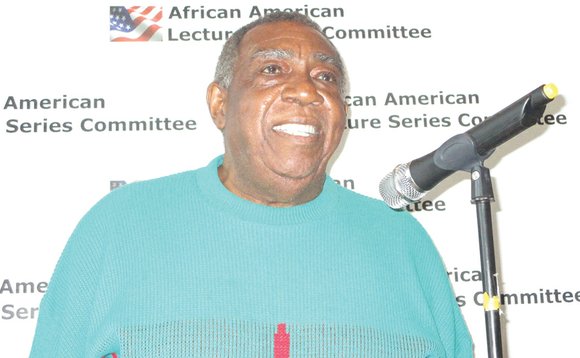Misinformation ‘devastating’ to African-American community
Joey Matthews | 2/12/2016, 6:58 p.m.

Journalist, author and lecturer A. Peter Bailey does not count himself among the fans of the popular, award-winning movie “Straight Outta Compton,” which chronicles the rise and fall of the legendary gangster rap group N.W.A.
“I refuse to go see it,” he told about 40 people at the 4th Annual State of Black America Address for Central Virginia on Saturday at Thirty-first Street Baptist Church in the East End.
“These young people (N.W.A. and other gangster rap groups) made their money by producing the kind of music, or what I call entertainment, where a whole lot of young dudes (listening to what the rappers advocated) either ended up dead or in jail,” he explained. “They basically are living on what I call blood money.
“They’ve become more respectful now,” he continued. “Some get invited to the White House now. I saw Snoop Doggy Dogg was honored at the Kennedy Center.”
Mr. Bailey, now in his 70s, is a native of Tuskegee, Ala. He later lived in Richmond, where he was a columnist for the Free Press. Several of his family members attended the forum.
Today, he resides in Washington, where he is an adjunct professor with the University of the District of Columbia and a columnist with Trice Edney Wire Service.
He spoke at the forum at the invitation of the African American Lecture Series Committee, which organizes the event.
Mr. Bailey told the church audience that African-Americans are constantly subjected to “psychological warfare” through the negative and inaccurate depictions of African-Americans and people of African descent in films, television, social media, other media and in history books.
He called the misinformation “devastating” to the black community because many people are “totally unaware” of what is happening to them.
Mr. Bailey said his education came through his relationship with the late Nation of Islam leader Malcolm X, who founded the Organization of Afro-American Unity in 1964 to fight for the human rights of African-Americans and promote cooperation among Africans and people of African descent in the Americas.
“Brother Malcolm was the first person I heard who talked about not only the physical manifestations” of racism, but “the psychological attacks on our minds.”
“It’s deadly,” Mr. Bailey said. “It affects how you think about yourself, how you act, how you respond to things.
“If we understand we’re involved in psychological warfare, then we can develop ways to deal with it,” he added. “It’s not insurmountable.”
In his nearly 30-minute address, Mr. Bailey also said “one of the most devastating things that happened with black folks in this country was our acceptance of the Brown v. Board decision” that gave the impression that “all black schools are inherently inferior, not inferior because of the policies of the state or of the attitudes of the larger society, but inferior just because they’re all black.
“If you accept that,” he added, “that translates into all black businesses are inferior, all black colleges are inferior, all black professionals are inferior and all black neighborhoods are inferior.”
He urged African-Americans to take pride in their talents and achievements and to fully support black educational institutions, black businesses and social justice efforts to uplift one another.
“We’re some tough, resilient people when you consider what we’ve had to go through,” he said. “We should all be half crazy. The fact that we have come through and achieved what we have is amazing and something to really take pride in.”
Other speakers at the forum discussed issues including laws and policies that discriminate against the African-American community. The focus was on Virginia’s $200 felony grand larceny threshold, which has saddled countless African-Americans and others with felony convictions for minor offenses that have become obstacles to affordable housing, jobs and equitable educational opportunities.
Participants also discussed the importance of the black community uniting to address efforts to repeal voting rights and to act as advocates on other issues.







